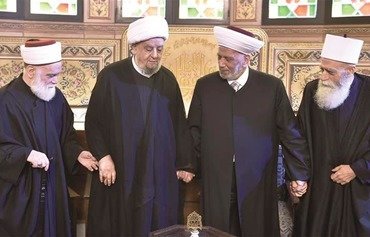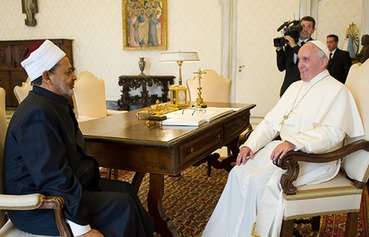The recent call from the Grand Imam of Al-Azhar for a fatwa that proscribes infighting between Sunnis and Shia has received positive response from both Muslim sects.
The call is important and timely, clerics told Al-Mashareq, as the region is fraught with sectarian tensions and the true nature of Islam is being undermined by extremist groups who commit criminal acts in the name of religion.
In a July 24th interview with Kuwaiti newspaper Al-Anbaa, Sheikh Ahmed al-Tayeb called on Sunni and Shia scholars to issue fatwas that proscribe infighting between the two sects and demand an end to the bloodshed in the region.
He said the onslaught of extremist ideology in the Muslim world has produced groups such as the "Islamic State of Iraq and the Levant" (ISIL) and the group formerly known as al-Nusra Front (ANF), among others.
Al-Azhar does not discriminate between Sunnis and Shia, he said, but rather upholds the Shahada -- the Muslim testament of faith that states there is no God but God, and Mohammed is his messenger.
Al-Azhar works to promote moderate Islam, he said, and continues to support the call for Sunni-Shia rapprochement issued by former Grand Imam of Al-Azahr Sheikh Mahmoud Shaltout and Shia cleric Taqiuddin al-Qummi.
"It has become easier to achieve Islam’s aims and counter extremist groups who issue fatwas that are contrary to religion, now that the despicable truth about them has been exposed," al-Tayeb said.
Urgent need to heal divisions
"The new call issued by the Grand Imam of Al-Azhar is of great importance because of its timing and the urgent need for it in light of the high sectarian tension enveloping the region," said Mazen Zaki, director of the media department at Egypt’s Ibn al-Waleed Centre for Studies and Field Research.
This is particularly important in light of the actions of extremist groups such as ISIL and the former ANF, now known as Fateh al-Sham Front, he said.
Al-Azhar is fully aware of the need for the issuance of such calls that will receive support from moderate Muslim clerics of both sects, he said.
"Al-Azhar in the recent period has been the target of numerous media campaigns that tried to tarnish its image and portray it as a symbol of the discord between Muslims," Zaki said.
The institution has countered these with concrete steps that included meetings between Al-Azhar scholars and Shia clerics, he said, noting that the Grand Imam also joined Shia Muslims in prayer in Indonesia earlier this year.
"The reality of the conflict between Sunnis and Shia on the ground is not what it seems or appears to mean," he said, adding that it is important to make the distinction between the two Islamic sects and those who seek to exploit them for their own political ends.
Al-Azhar has "stated on more than one occasion that it makes a distinction between true Shiasm and the political Shiasm that is being disseminated by way of financial inducements", he said, adding that the essence of the relationship must be restored to its true nature.
Sunni-Shia rapprochement
"The calls issued by Al-Azhar seriously seek to achieve rapprochement between Sunnis and Shia," said Al-Azhar University professor of comparative jurisprudence Sheikh Ahmed Karima, a member of the Association of Senior Scholars.
"The Grand Imam’s call is not the only one, as it was preceded by many in the past, by both Al-Azhar institution and Al-Azhar imams," he told Al-Mashareq.
Every action taken to achieve rapprochement between the two main Islamic sects is "is for the betterment of Muslims and a key means to eliminate the sectarianism plaguing Muslim societies, because remedying sectarianism reforms Muslim society as a whole", he said.
The sectarian conflict has produced many other conflicts and has divided the peoples of the region into rival camps, he said, telling Al-Mashareq he is heading a group of Al-Azhar scholars who will soon begin preparing an expanded dossier on Sunni-Shia rapprochement.
This will refute many of the misconceptions extremist groups such as ISIL are trying to spread in the name of religion, he added.
Exposing falsity of extremists
Lebanese cleric Sheikh Hassan Mchaymech, a Shia who belongs to the Independent Scholars Forum, welcomed the Grand Imam's gesture.
He told Al-Mashareq that he, in turn, calls on "all Muslim scholars around the world, without exception, to issue a fatwa that proscribes infighting between Sunnis and Shia".
The Grand Imam of Al-Azhar's call for rapprochement seeks to preserve Muslim blood, unity and cohesion, Mchaymech said.
"The jurisprudential effort being made to achieve rapprochement between Shia and Sunni Muslims is a necessity in order for Muslims to integrate and unite," he added, calling for a wholehearted response to the Grand Imam's initiative.
Muslim scholars should uphold this initiative, he said, because it aims to expose the truth about the "savage and criminal" extremists operating in the name of religion who have harmed the image of Islam.

![Grand Imam of Al-Azhar Sheikh Ahmad al-Tayeb has called on Sunni and Shia scholars to issue a fatwa proscribing infighting among Sunnis and Shia. [Waleed Abu al-Khair/Al-Mashareq]](/cnmi_am/images/2016/08/16/5988-Egypt-azhar-building-600_384.jpg)







This is good news for the Brotherhood & Sisterhood of True Islam under the One God!
Reply3 Comment(s)
It is essential to bring the two branches of Islam closer together because the recent conflicts, which are exploited for political reasons, have provoked massacres of Shiites in Egypt, African countries and in Syria. It seems that the speeches of Al Azhar are starting to have an effect, and all the better.
Reply3 Comment(s)
Thank Allah. This is what should be said; we’re Muslims and we shouldn’t be fighting each other.
Reply3 Comment(s)